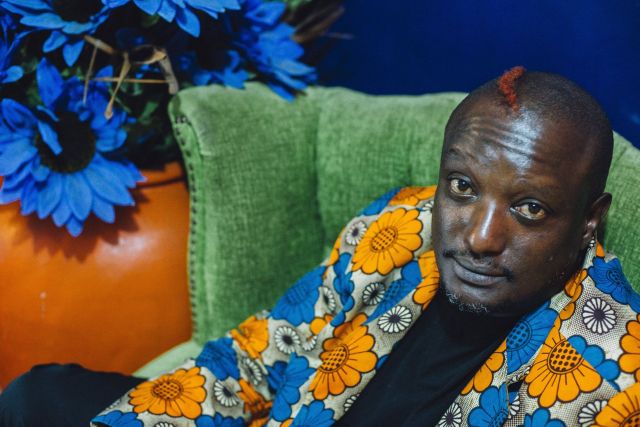Kenya, Literature, 2016
Binyavanga
Wainaina

In the past few years there has been much talk about the worldwide boom of the “new” African literature. One term in particular raised a lot of attention: In 2005, Taiye Selasi coined the word “Afropolitains,” which she used to describe the younger generation of cosmopolitan authors with roots in Africa but at home everywhere.
A few years later, the writer and journalist Binyavanga Wainaina became one of the most vocal critics of the term: Born in 1971 in Kenya, the writer blasted the crude conformism inherent in the Western-dominated literature market in his lecture provocatively titled “I am a Pan-Africanist, not an Afropolitain.” As an alternative, Binyavanga Wainaina pled for a kind of African literature that he defined as “spectral”: he reasoned that the internet could be the most forceful driver and promoter of African authors, because every author from Africa could use it, even if they lacked access to the Anglo-American-dominated Western literary market because of location or background. He argued that the internet could liberate these writers from constraints imposed by the marketplace. He has first-hand knowledge of these: When he submitted his autobiographical short story “Discovering Home” for the prestigous Caine Prize for African Writing in 2002, his text was almost rejected because it had by that point only been published online, and there was no print edition, as mandated by the prize criteria. In an email reply, Binyavanga Wainaina noted that only one anthology with texts from African writers had been published in the previous ten years; that’s why he wondered what sources the committee had access to. Impressed with his self-confidence, the committee bought his argument, and “Discovering Home” was honored as the best story. Binyavanga Wainaina then founded the Kwani Trust with his prize money: In 2003, it published the first issue of the magazine Kwani?, which would later become the mouthpiece and literary home for a new, largely unknown generation of African authors. The date of its founding was no accident: at that time, Kenya’s long-term autocratic ruler President Daniel Arap Moi had announced he would step down to make way for his successor Mai Kibaki. It was a time of political and intellectual renewal in the country: newspapers, radio stations, the arts, and literature all felt a sense of liberation after years of repression and restraint. In “One Day I Will Write about this Place,” the author wrote about his experiences growing up as a Gikuyu during repressive times and not belonging to the ruler’s ethnicity: Although he and his sister got the best grades in their school, for example, they did not earn a spot in the secondary schools. On a flight, a stewardess harasses the young man, repeatedly asking his last name, in order to reveal his background. Written in the present-tense from the perspective of both an adolescent with an explosive imagination and from the distanced retrospective point-of-view of a worldly intellectual, he creates autobiographical scenes brimming with an attention to detail, smoothly blending elements of contemporary history, pop culture, and family life. Deftly juggling languages, dialects, sounds, and tones, these personal memories show more universal themes with their vivid imagery about social and political changes in post-colonial East and South Africa. In the early 1990s, Binyavanga Wainaina studied business in South Africa to appease his father, though he couldn’t imagine anything better than finally becoming a writer. He was a stranger in South Africa, to say the least; as a child, he had even felt like a stranger in his own country: the text “One Day I Will Write about this Place” offers snapshots of his life as an outsider and son of a middle-class family – and as an oddball who liked to lock himself up in his room, surrounded by books. Covering the era from the 1970s up to the present, Binyavanga Wainaina’s memoir is also an expression of his search for an identity not based on nationality – a search that likely lasted until he publicly came out of the closet in January 2014. At that time, homophobic rhetoric in Kenya reached a boiling point; in neighboring Uganda, his mother’s homeland, a law was proposed in parliament that would render homosexuality a crime publishable by death. Under these circumstances, coming out of the closet could be considered a conscious act of provocation. Over the years, the Kwani Trust has become an established name, publishing some of the most famous African writers from many different countries. Kwani? is understood to be a place where the continent itself can present itself as an historical site. It is also Binyavanga Wainaina’s answer to the Western-defined, cliché-ridden notion of “African literature,” which he analyzed in his brilliant 2005 satire “How to Write About Africa.” The text is now a standard work in debates around the world – and it rocketed its author to fame: in 2008, he became the Sterling Brown Guest Professor at Williams College, and from 2008 until 2012 he directed the Chinua Achebe Center for Writers and Artists at the prestigious Bard College in New York. It’s been Chinua Achebe, who had called previous to him for Africa to be written about from the point-of-view of its inhabitants. Despite his success, Binyavanga Wainaina remains troubled by the West: For example, a story about Sudan commissioned by the EU was never published because referred to South Sudan as an independent nation (before its founding in 2011) and refused to change the wording. Nevertheless: the writer Wainaina will remain an important figure on the literature map for years to come – and not just for Anglophone African literature.
Text: Claudia Kramatschek
Translation: Amy Pradell
Eines Tages werde ich über diesen Ort schreiben. Erinnerungen. Translated from the English by Thomas Brückner. AfrikaWunderhorn. Verlag Das Wunderhorn. Heidelberg 2013.


